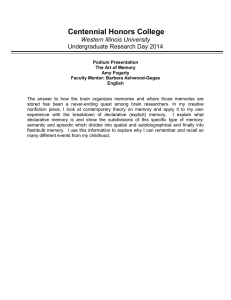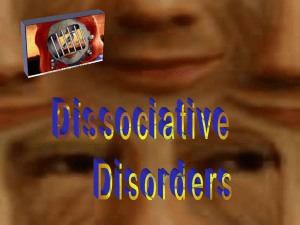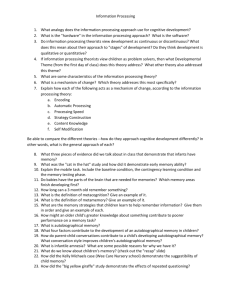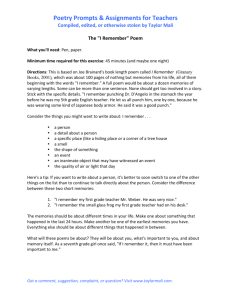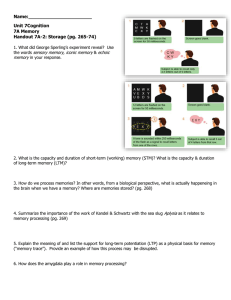12653380_Panel intro.docx (243.2Kb)
advertisement
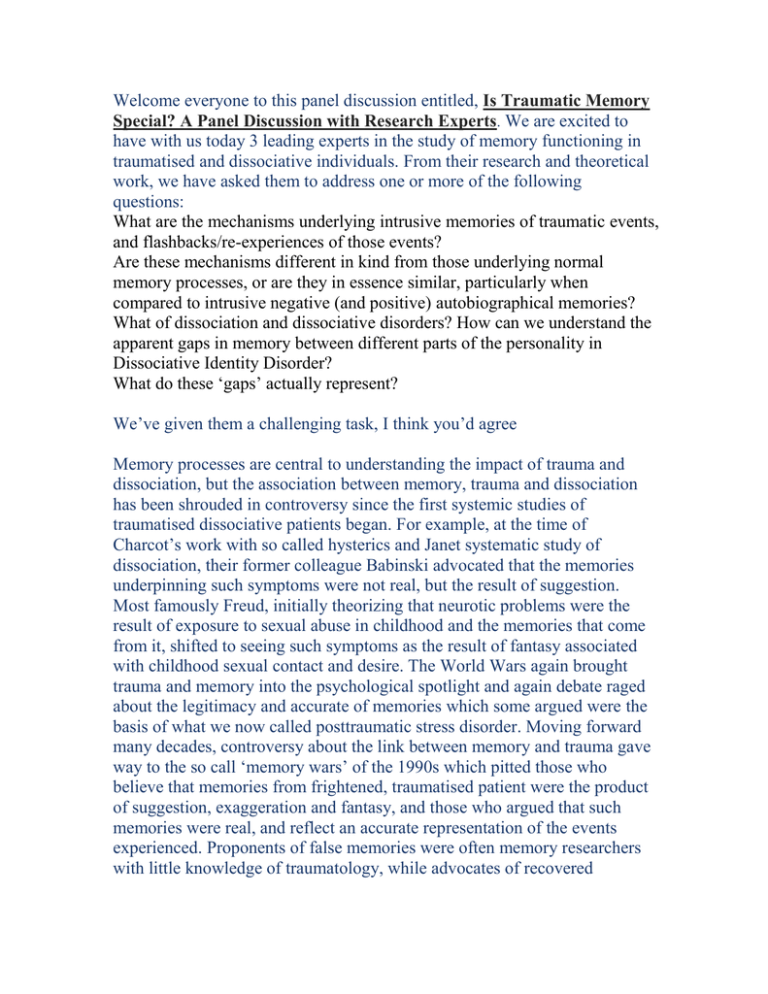
Welcome everyone to this panel discussion entitled, Is Traumatic Memory Special? A Panel Discussion with Research Experts. We are excited to have with us today 3 leading experts in the study of memory functioning in traumatised and dissociative individuals. From their research and theoretical work, we have asked them to address one or more of the following questions: What are the mechanisms underlying intrusive memories of traumatic events, and flashbacks/re-experiences of those events? Are these mechanisms different in kind from those underlying normal memory processes, or are they in essence similar, particularly when compared to intrusive negative (and positive) autobiographical memories? What of dissociation and dissociative disorders? How can we understand the apparent gaps in memory between different parts of the personality in Dissociative Identity Disorder? What do these ‘gaps’ actually represent? We’ve given them a challenging task, I think you’d agree Memory processes are central to understanding the impact of trauma and dissociation, but the association between memory, trauma and dissociation has been shrouded in controversy since the first systemic studies of traumatised dissociative patients began. For example, at the time of Charcot’s work with so called hysterics and Janet systematic study of dissociation, their former colleague Babinski advocated that the memories underpinning such symptoms were not real, but the result of suggestion. Most famously Freud, initially theorizing that neurotic problems were the result of exposure to sexual abuse in childhood and the memories that come from it, shifted to seeing such symptoms as the result of fantasy associated with childhood sexual contact and desire. The World Wars again brought trauma and memory into the psychological spotlight and again debate raged about the legitimacy and accurate of memories which some argued were the basis of what we now called posttraumatic stress disorder. Moving forward many decades, controversy about the link between memory and trauma gave way to the so call ‘memory wars’ of the 1990s which pitted those who believe that memories from frightened, traumatised patient were the product of suggestion, exaggeration and fantasy, and those who argued that such memories were real, and reflect an accurate representation of the events experienced. Proponents of false memories were often memory researchers with little knowledge of traumatology, while advocates of recovered memory were often traumatologist with little knowledge of the memory research. Cognitive science has taken great strides since Tulving differentiated episodic from semantic memory, and there is now a great appreciate of the multiple memory systems and their different functions that make up human memory. Our speakers today represent a unique brand of scholar, they are leading cognitive scientists in the field of traumatology, studying traumatised individuals using the most relevant and sophisticated theories and techniques from cognitive science. All have made significant and highly original empirical and theoretical contributions to the understanding of memory processes in traumatised and dissociative individuals. Our first speaker is: Chris Brewin: Professor of Clinical Psychology at University College London. He has been at the forefront of understanding memory processes in mood and anxiety disorder, especially PTSD and developing testable theories to explain how memory problems are associated with PTSD symptoms, particularly intrusion. He is a leading figure in the ICD-11 revisions for stress-related orders and author of the influential book ‘Posttraumatic stress disorder: malady or myth”. His paper today is entitled, “Not Special but Unusual: How the Balance of Episodic and Perceptual Memory is Affected in PTSD”. Dorthe Berntsen, professor of Psychology. Center on Autobiographical Memory Research in the Department of Psychology and Behavioural Sciences at the Aarhus University, Denmark. She has been a dominant figure is the development of a model that articulates how normal memory functions and systems may account for PTSD symptoms, which has been fleshed out in numerous papers along with her recent book, Involuntary Autobiographical Memories: An Introduction to the Unbidden Past. Her paper today is entitled Intrusive memories of traumatic events: How should they be explained? Rafaele Huntjens is assistant professor of Psychology in the Department of Clinical psychology and experimental psychopathology at the University of Groningen, The Netherlands. She is the foremost empirical researcher of memory processes in dissociative identity disorder and her work is offering new way of understanding the complex processes associated with interidentity amnesia in DID. She has substantial increased the scientific rigor of research designs studies cognitive processes in DID, and provide the benchmark for future studies. Her paper today is entitled…
